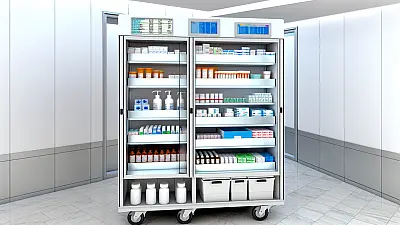AUBURN, WA - State inspectors documented multiple infection control violations at North Auburn Rehab & Health Center during an April 2025 inspection, including improper hand hygiene practices, contaminated medical equipment storage, and unsafe medication administration procedures that placed residents at risk for healthcare-associated infections.

Critical Hand Hygiene Failures During Patient Care
The most serious violations involved staff members failing to follow basic hand hygiene protocols during intimate patient care procedures. Inspectors observed three separate incidents where nursing staff provided direct care to residents without proper hand sanitization.
During catheter care for one resident, inspectors documented a certified nursing assistant (CNA) who changed contaminated gloves without washing hands between procedures. The staff member had handled soiled materials and touched bathroom surfaces before continuing with clean care tasks. When directed by a supervisor to perform hand hygiene, the CNA had to leave the room to find hand sanitizer, further compromising the sterile procedure.
The resident being cared for recognized the infection risk, stating during the inspection: "That's not helpful, (they) touched the doorknob then touched it again on the way back in." This comment highlights how obvious the contamination risk was to patients receiving care.
In another incident, a CNA provided incontinence care to a resident with loose stool, cleaning fecal matter from the patient's catheter tubing. The staff member changed gloves between handling contaminated materials and performing clean care tasks but failed to sanitize hands between glove changes. When questioned later, the staff member acknowledged: "They should have performed hand hygiene between dirty and clean care glove changes, but they did not."
These hand hygiene failures represent fundamental breaches of infection control protocols. Proper hand sanitization between contaminated and clean procedures is critical for preventing healthcare-associated infections, particularly urinary tract infections and wound contamination in vulnerable nursing home populations.
Contaminated Medical Equipment Storage Practices
Inspectors identified systematic problems with medical equipment storage and labeling across multiple resident rooms. Personal care items were stored improperly, creating cross-contamination risks between residents.
In several bathrooms, inspectors found unlabeled urinals without lids placed on toilet backs, unidentified basins on floors without protective bags, and measurement containers lacking proper resident identification. These conditions persisted across multiple inspection days, indicating systemic rather than isolated problems.
The facility's own Assistant Director of Nursing confirmed during interviews that "personal care items in bathrooms should be labeled with resident names, anything stored on the floor should be bagged, and urinals should have lids and be stored in a bag." However, actual practices fell far short of these standards.
Proper medical equipment storage serves multiple infection control purposes. Labeling prevents cross-contamination between residents, while lids and protective bags create barriers against airborne pathogens. Floor storage without protection exposes equipment to environmental contaminants that can cause serious infections in immunocompromised nursing home residents.
Unsafe Medication Administration Procedures
During medication rounds, inspectors observed a licensed practical nurse placing multiple medication containers directly on a resident's bed without protective barriers. The nurse administered eye drops, inhalers, and nasal spray while the containers sat on potentially contaminated bed linens, then placed the now cross-contaminated medications back on the medication cart without cleaning.
This practice violates basic sterile technique principles for medication administration. Bed linens and surfaces in healthcare environments harbor pathogens that can contaminate medication containers, potentially causing eye infections, respiratory tract infections, or other medication-related complications.
The facility's Director of Nursing acknowledged during interviews that "staff should use barriers to prevent cross contamination during medication pass," indicating awareness of proper procedures that weren't being followed.
Medical Context and Health Risks
These infection control failures create substantial health risks for nursing home residents, who typically have compromised immune systems, chronic medical conditions, and increased susceptibility to healthcare-associated infections.
Inadequate hand hygiene during catheter care significantly increases urinary tract infection risk. UTIs in nursing home residents can progress rapidly to sepsis, a life-threatening condition with mortality rates exceeding 20% in elderly populations. Proper hand sanitization between contaminated and clean procedures reduces UTI risk by up to 40% according to healthcare research.
Contaminated medical equipment storage enables pathogen transmission between residents. Shared urinals and basins without proper disinfection can spread antibiotic-resistant bacteria, including MRSA and C. difficile, both serious threats in nursing home environments.
Unsafe medication administration practices can introduce pathogens directly into vulnerable body systems. Contaminated eye drops can cause serious ocular infections requiring surgical intervention, while contaminated respiratory medications can trigger pneumonia in residents with existing breathing difficulties.
Face Mask Compliance Issues
Inspectors also documented inconsistent face mask usage among staff members. One therapy staff member was observed walking with a resident while wearing a surgical mask below the nose, reducing its protective effectiveness. Another staff member was found sitting in a resident care area without any mask, despite facility policies requiring surgical masks in all patient areas.
The facility's infection preventionist confirmed expectations that staff wear surgical masks in resident areas, but actual compliance was inconsistent during the inspection period.
Additional Issues Identified
Beyond the major violations, inspectors noted several other infection control concerns. These included improper gloving procedures during enteral feeding care, where a nurse failed to perform hand hygiene before putting on gloves for a resident requiring enhanced barrier precautions due to feeding tube needs.
The systematic nature of these violations suggests gaps in staff training, supervision, and accountability systems rather than isolated incidents. Effective infection control requires consistent adherence to protocols across all shifts and departments.
The April 2025 inspection findings represent serious departures from accepted healthcare standards that placed multiple residents at unnecessary risk for preventable infections. Proper implementation of basic infection control measures - including hand hygiene, equipment storage, and sterile technique - forms the foundation of safe healthcare delivery in nursing home environments.
Full Inspection Report
The details above represent a summary of key findings. View the complete inspection report for North Auburn Rehab & Health Center from 2025-04-21 including all violations, facility responses, and corrective action plans.
💬 Join the Discussion
Comments are moderated. Please keep discussions respectful and relevant to nursing home care quality.